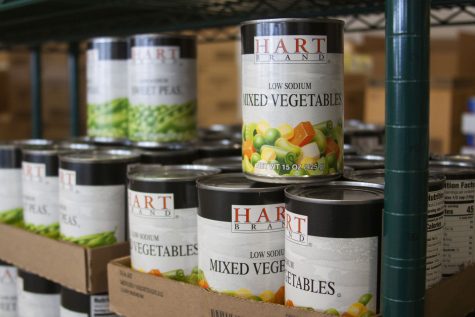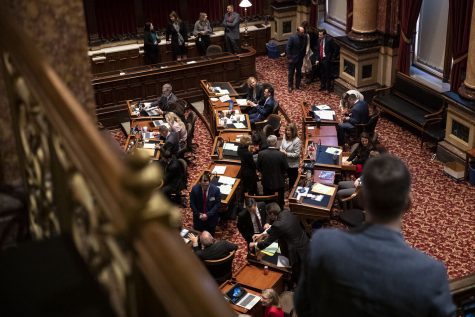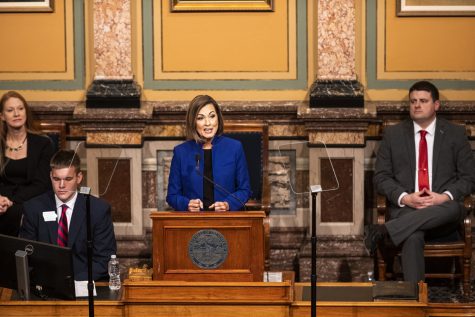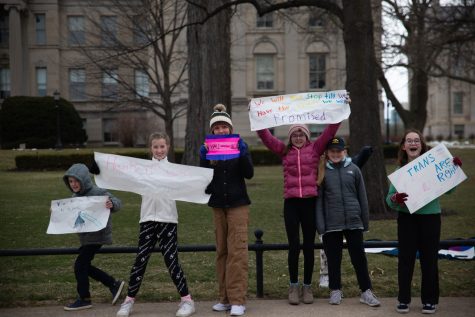Politics Notebook | House passes bill restricting eminent domain use for carbon capture pipelines
Also, Senate passes a bill adding asset tests for the Iowa food stamps program.
The Iowa State Capitol is seen before the opening of the 2022 Legislative Session in Des Moines, Iowa, on Monday, Jan. 10, 2022. At the State Capitol, legislative leaders spoke in their chambers while rally members congregated in the rotunda in support of freedom. The 2022 Legislative Session started today and will end in April.
March 23, 2023
Under a bill passed by the Iowa House on Wednesday, private companies constructing carbon capture pipelines would be required to obtain voluntary land rights for 90 percent of the length of the pipeline route before they can petition the Iowa Utilities Board for eminent domain permissions.
House File 565 expands landowner rights in relation to carbon capture pipelines and the use of the eminent domain.
Specifically, the bill gives greater autonomy to landowners, allowing them to petition the Iowa Utilities Board. It also allows the landowners to file an action for relief against the pipeline companies and renegotiate damages and settlement terms relating to crop damage with the pipeline companies.
Former Iowa Democratic Party Chair and current Rep. Ross Wilburn, D-Ames, said he doesn’t support the bill because it doesn’t work to stop the pipeline or provide meaningful protections to landowners.
“We are long past policy on this bill; it is pure politics, and the effect is to divide people,” Wilburn said during floor debate on Wednesday. “It undermines the role of the utility board. It’s not going to appear on the floor of the Senate, and even if it did the governor will not sign this bill, in my opinion.”
Senate Majority Leader Jack Whitver, R-Grimes, previously told reporters that the bill could reach the Senate floor but the debate would not be easy.
Another subsection of the bill created an interim committee to study the issues surrounding eminent domain, landowner rights, and land restoration standards and report back to the body with recommendations on the issues.
The bill passed, 73-20, with five members not voting and two abstaining because of House Rule 76, which requires that members of the legislature invoke the rule and abstain if they or their family members have a financial interest in the matter at hand.
Iowa Senate passes bill requiring an “asset test” for food assistance programs, additional oversight
Under a bill passed by the Iowa Senate Wednesday, food assistance applicants would have to pass an “asset test” that bars applicants with more than $5,000 worth of cash, savings, investment accounts, and other non-liquid assets.
The asset test is a part of federal guidelines for the Supplemental Nutrition Assistance Program (SNAP) that requires that applicants have less than a particular amount of assets as set by the U.S. Department of Agriculture based on household demographics.
Sen. Jason Schultz, R-Schleswig, said he supports the bill because it enforces the requirements already set to be eligible for food assistance by the federal government, and gives actionable tools to the state to ensure eligibility.
Iowa Senate Democrats said the asset test creates unnecessary barriers for Iowa families to getting food assistance. The test is not required for the state to be eligible to receive federal funds.
Iowa Senate Democratic Whip Sarah Trone Garriott, a Democrat from Windsor Heights, said the state’s current food assistance program helps children in need thrive.
“I hear a lot of talk in this chamber about protecting children, caring for children, protecting children’s mental health but none of it means a thing if we aren’t sure that all Iowa children have their basic needs met,” Trone Garriott said. “It’s really, really important that children do not lose access to these vital programs because these are significant changes.”
Senate File 494, which passed 34-16, also increases oversight of food assistance programs, requiring the Iowa Department of Health and Human Services, which oversees the program, to implement a prior check verifying applicant information before receiving benefits.
The bill also requires the department to provide a report to the governor and the legislature by 2025 on the results of the program.












